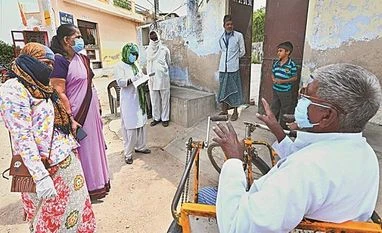Earlier this year, when the country was in the grip of the third wave of Covid-19, the family of Prasad Yadav wanted to get him vaccinated. But they didn’t anticipate the hurdles that came in the way of the 45-year-old resident of Aurangabad, Maharashtra.
Yadav, who has cerebral palsy, lost his vision two years ago. He lacks identity cards such as a PAN (permanent account number) or Aadhaar, which records biometric details that he simply cannot provide due to his inability to keep his head or fingers still.
The fact that he doesn’t have a disability card was enough for the authorities to refuse to vaccinate Yadav. After being pushed from pillar to post, a relative managed to contact a disability commissioner in another state (whose details his family did not want to share) who arranged for a vaccine to be administered at his home.
Harish Janardhan, a resident of Chennai, faced a similar situation last year. He tried to arrange home vaccination for his mother, who is bedridden and suffers from Parkinson’s disease, but was denied by the city’s civic body for the lack of a disability card.
The home vaccination programme that was initiated by the Union government does not inoculate individuals without disability cards. And the obstacles for persons with disabilities (PwDs) extend beyond digital or physical IDs. As India sees another uptick in Covid-19 cases, public health experts and rights activists rue the lack of data available for vaccination of people with disabilities.
According to Vaishnavi Jayakumar, Member, Disability Rights Alliance, the lack of centralised data on PwDs proved to be a barrier even for crisis intervention during the initial stages of the lockdown. “Destitute people with mobility challenges, who are dependent on street vendors or <dabbawalas> (tiffin box carriers) for food, went hungry for days. People with mental health issues struggled to source psychotropic medication in the limited pharmacies open,” she says.
The Centre has said in Parliament that segregated data of unvaccinated people on the basis of government-issued IDs — which include passport, driving licence, pension passbook, National Population Register Smart Card, voter ID and ration card — is not maintained. CoWin, the app developed by the Centre for facilitation of vaccines, has a dashboard that provides daily and cumulative vaccination data but it does not keep segregated data on different sections.
Last year, according to a statement by the health ministry in Parliament, only 4,018 people with disabilities had received both doses of vaccine till November 2021. According to the Census 2011, India had 26.8 million people with disabilities.
Given the absence of data, many have questioned the impact of Har Ghar Dastak, a nationwide door-to-door vaccination campaign launched by the Centre.
Srinivas Goli, a medical officer working with the Municipal Corporation of Delhi, admitted that the scant available data on PwDs doesn’t paint a true picture. “Even though authorities don’t keep such data, it is important to note certain anomalies. Vaccinations started in the first quarter of 2021, but some places began to register PwDs only after June-July. Many weren’t registered as PwDs.”
A lack of awareness among people has also compounded troubles. Goli, who has been running medical camps in the national capital, said: “Quite a few times, people with disabilities have volunteered to help me in these camps. The lack of awareness runs so deep that often people with disabilities themselves don’t know medical terms for disabilities or abbreviations like PwDs.”
Accessibility is a concern for many. Meenakshi, who identified only by her first name, went to a public health centre at Perumbakkam on the outskirts of Chennai. To her dismay, the ramp for wheelchair users was broken. She had to wait in line for two hours before her turn came to get a dose.
In some cases, vaccination centres for PwDs have also shut down. For instance, the Delhi government had in May 2021 designated 10 sites for vaccinating people with disabilities. At least three places confirmed that they have shut their services owing to a combination of low turnout and reopening of schools.
As Jayakumar pointed out, proving one’s disability could also become a difficult task. “While those who visited vaccination centres encountered physical barriers at the venues, besides a lack of privacy, the lack of accessibility to websites was a big issue for the blind. The absence of ‘easy read’ and multilingual or multimodal crisis resulted in misinformation having a free rein,” she added.
Unlock 30+ premium stories daily hand-picked by our editors, across devices on browser and app.
Pick your 5 favourite companies, get a daily email with all news updates on them.
Full access to our intuitive epaper - clip, save, share articles from any device; newspaper archives from 2006.
Preferential invites to Business Standard events.
Curated newsletters on markets, personal finance, policy & politics, start-ups, technology, and more.
)